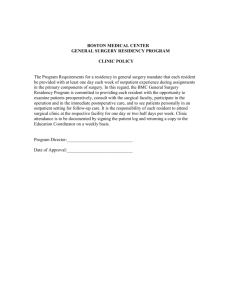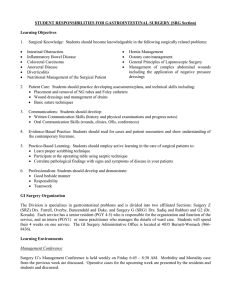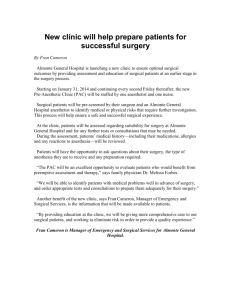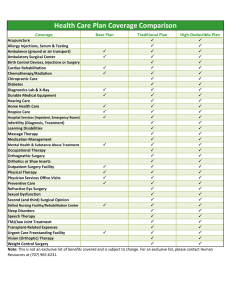eSTUDENT RESPONSIBILITIES FOR SRZ Learning Objectives
advertisement
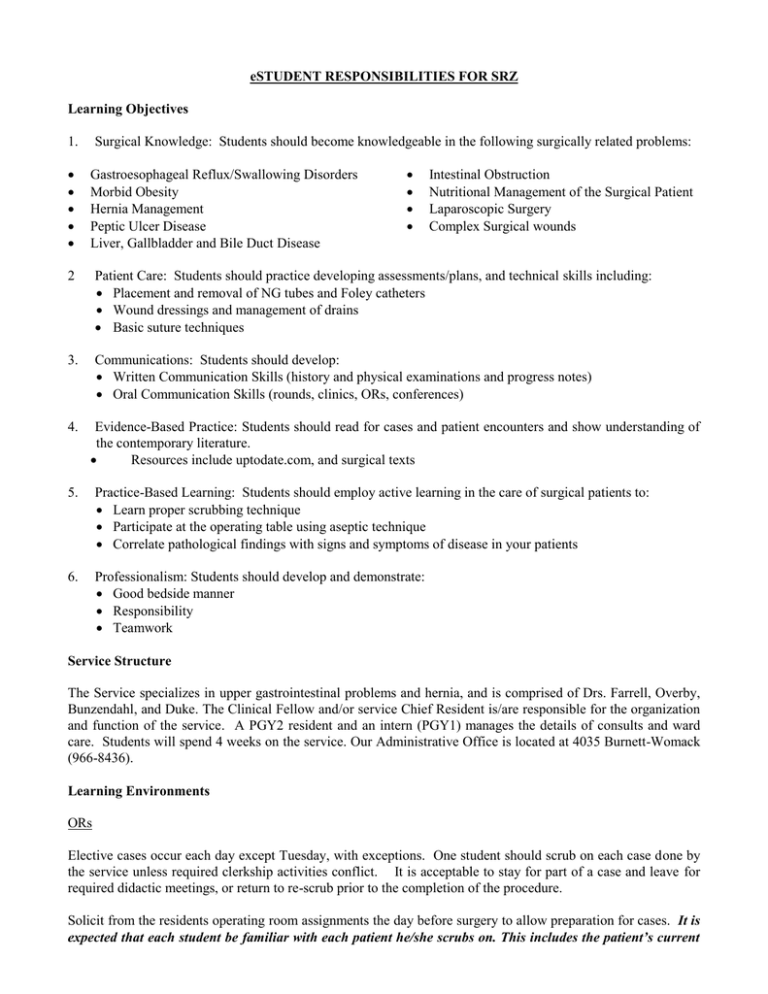
eSTUDENT RESPONSIBILITIES FOR SRZ Learning Objectives 1. Surgical Knowledge: Students should become knowledgeable in the following surgically related problems: Gastroesophageal Reflux/Swallowing Disorders Morbid Obesity Hernia Management Peptic Ulcer Disease Liver, Gallbladder and Bile Duct Disease Intestinal Obstruction Nutritional Management of the Surgical Patient Laparoscopic Surgery Complex Surgical wounds 2 Patient Care: Students should practice developing assessments/plans, and technical skills including: Placement and removal of NG tubes and Foley catheters Wound dressings and management of drains Basic suture techniques 3. Communications: Students should develop: Written Communication Skills (history and physical examinations and progress notes) Oral Communication Skills (rounds, clinics, ORs, conferences) 4. Evidence-Based Practice: Students should read for cases and patient encounters and show understanding of the contemporary literature. Resources include uptodate.com, and surgical texts 5. Practice-Based Learning: Students should employ active learning in the care of surgical patients to: Learn proper scrubbing technique Participate at the operating table using aseptic technique Correlate pathological findings with signs and symptoms of disease in your patients 6. Professionalism: Students should develop and demonstrate: Good bedside manner Responsibility Teamwork Service Structure The Service specializes in upper gastrointestinal problems and hernia, and is comprised of Drs. Farrell, Overby, Bunzendahl, and Duke. The Clinical Fellow and/or service Chief Resident is/are responsible for the organization and function of the service. A PGY2 resident and an intern (PGY1) manages the details of consults and ward care. Students will spend 4 weeks on the service. Our Administrative Office is located at 4035 Burnett-Womack (966-8436). Learning Environments ORs Elective cases occur each day except Tuesday, with exceptions. One student should scrub on each case done by the service unless required clerkship activities conflict. It is acceptable to stay for part of a case and leave for required didactic meetings, or return to re-scrub prior to the completion of the procedure. Solicit from the residents operating room assignments the day before surgery to allow preparation for cases. It is expected that each student be familiar with each patient he/she scrubs on. This includes the patient’s current disease process requiring surgical intervention, additional past medical history, the proposed procedure, the basic steps of the procedure, and pertinent anatomy. Students should make every effort to see the patients preop. At a minimum chart review should be accomplished. It is the student's responsibility to check on the time of the operative procedure so that he/she may plan his/her activities to be present. You should write your name on the white board in the room for any case in which you will participate. You should pull your sterile gloves, and provide them to the surgical tech. Introduce yourself to the operating room staff so they know who you are, and your role. Clinics Clinics are held in the first floor GI Surgery Clinic or at the Ambulatory Care Center (ACC). These are likely to change with the change in faculty, clinic schedules are: Monday o Farrell (9:00 – 4:00) GI Surgery Clinic 1st floor Memorial Hospital o Duke (12:00-4:00 GI Surgery Clinic 1st floor Memorial Hospital Tuesday o Overby (8:30 – 4:00) GI Surgery Clinic 1st floor Memorial Hospital o Bunzendahl (Noon to 4:00) GI Surgery Clinic 1st floor Memorial Hospital Wednesday o Duke (8:30-12:00) GI Surgery Clinic 1st floor Memorial Hospital Thursday o Bunzendahl (Noon to 4:00) GI Surgery Clinic 1st floor Memorial Hospital New patients, postoperative follow-up patients, and preoperative referrals are seen. Most elective cases are admitted through these clinics. Student attendance is required when not involved in ORs or required educational sessions. Rounds The team rounds twice daily. Morning rounds are focused on initiating plans for all patients in an efficient way, before OR/conference obligations begin. Students will “pick-up” patients through the ORs and clinics and will be asked to assist in the process of pre-rounding and presenting for these patients. Afternoon rounds occur near the end of the day and are geared toward education of junior trainees and safe transfer of patients to the on-call coverage team. Assignments X-ray Presentation Please find an interesting or educational radiograph to use as a source for a required oral case presentation (5 minutes). Students must present one X-ray as part of one Tuesday case conference during their 4 weeks on the rotation. No slides or handouts are required, but only a well prepared and orderly presentation of the patient’s presentation and the chosen film. Progress Notes and Daily Orders -2- Students are to learn to write notes and orders. Epic allows progress note entry by students, and these should be written daily for the patients you are following and then electronically routed to your intern for feedback. Students should endeavor to write admission, postoperative and interim orders while on service. Conferences In addition to Departmental conferences and Clerkship requirements, SRZ conferences occur as follows: 1. Case Conference and M/M – 7:30 am Tuesday, Burnett Womack, Room 4050 2. Rounds with Attending GI Surgeon – to follow Tuesday, Burnett Womack, Room 4050 3. GI Medicine/GI Surgery Conference (except summer) - 5:30 pm Tuesday - OR classroom Evaluations At the completion of each rotation, the attendings and house staff meet to discuss the performance of the students. A consensus evaluation form is then submitted through One45, usually within two weeks of the end of the rotation. Students are encouraged to meet with faculty members to review their evaluations. Revised 6/14/2015 -3-
